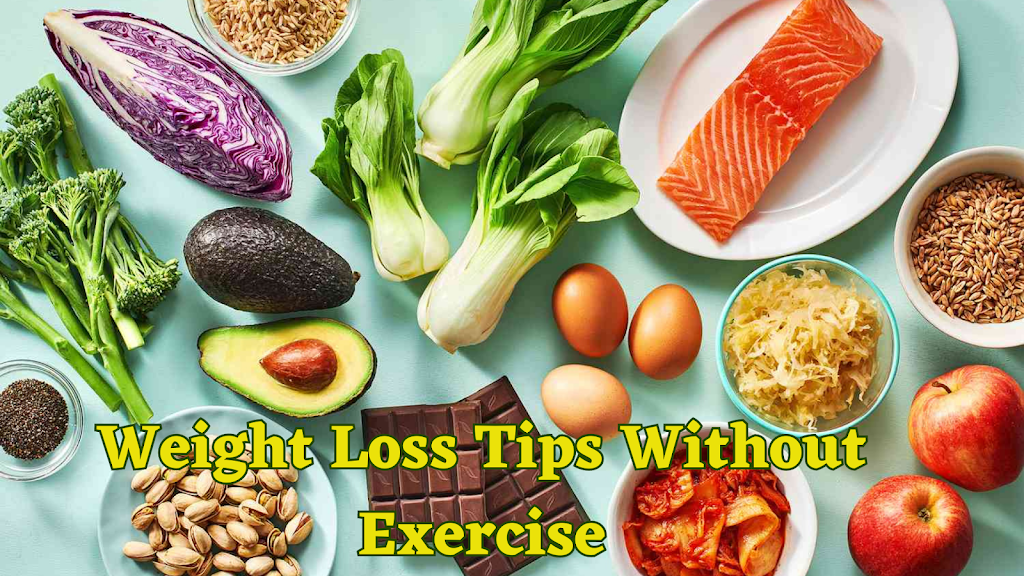
If you are looking to lose weight without working out, there are some simple but effective strategies that you can follow. These tips are easy to implement and can help you shed those extra pounds without hitting the gym. Let’s take a look at some of the best weight loss tips without exercise
Importance of Weight Loss
Excess weight can pose various health risks, including heart disease, diabetes, and joint problems. By adopting healthy habits and shedding those extra pounds, you can improve your overall well-being and reduce the risk of these conditions.
1. Eat More Protein: Protein is known to be an excellent nutrient for weight loss. It can help you feel full for longer periods and reduce your cravings for unhealthy foods. Make sure to include protein-rich foods in your diet such as lean meats, eggs, fish, and dairy products. Studies have shown that people who eat a high-protein diet tend to lose more weight compared to those who consume a low-protein diet.
2. Drink Plenty of Water: Drinking water is essential for weight loss as it helps to flush out toxins from your body and keeps you hydrated. Drinking water before meals can also help you eat less and reduce your calorie intake. Aim to drink at least eight glasses of water a day.
3. Get Enough Sleep: Sleep is often overlooked when it comes to weight loss, but it plays a crucial role in regulating your metabolism and appetite. Lack of sleep can lead to weight gain as it increases your hunger hormones and decreases your fullness hormones. Aim to get at least seven to eight hours of sleep every night.
4. Avoid Processed Foods: Processed foods are often high in calories, sugar, and unhealthy fats. They can also lead to inflammation in your body, which can contribute to weight gain. Avoid processed foods and opt for whole, nutrient-dense foods such as fruits, vegetables, whole grains, and lean proteins.
5. Reduce Your Stress Levels: Stress can lead to overeating and weight gain. It increases the production of cortisol, a hormone responsible for storing fat in your body. Find ways to reduce your stress levels such as practicing yoga, meditation, or deep breathing exercises.
6. Use Smaller Plates: Using smaller plates can trick your mind into thinking that you are eating more than you actually are. It can help you reduce your portion sizes and consume fewer calories. Opt for smaller plates and bowls to help you eat less without feeling deprived.
7. Chew Your Food Slowly: Chewing your food slowly can help you feel full faster and reduce your calorie intake. It takes around 20 minutes for your brain to register that you are full, so take your time when eating to avoid overeating.
Tracking Progress
It’s essential to track your development if you want to maintain motivation and make the required corrections. Maintain a meal journal, monitor your weight, and frequently take measurements. Enjoy your successes and take the opportunity to learn from any disappointments.
Tips for Sustainable Weight Loss
-
Setting attainable objectives is crucial for long-term weight loss. Instead of focusing on immediate fixes, strive for steady and gradual growth.
-
Get assistance Have a network of people who will be there for you, whether they are in-person or online.
-
Keep calm: Being patient with yourself is crucial since losing weight takes time.
-
Avoid crash diets: Choose a healthy, balanced diet instead of an extreme diet that is difficult to follow.
-
Remain consistent: Accept healthful behaviors as a way of life rather than a band-aid.
Common Pitfalls
While on your weight loss journey, be aware of common pitfalls that may hinder your progress. These include:
-
Emotional eating: Recognize and address emotional triggers that lead to unhealthy food choices.
-
Unrealistic expectations: Avoid comparing your progress to others and focus on your own goals.
-
Lack of support: Surround yourself with individuals who support and encourage your efforts.
-
All-or-nothing mindset: Don’t let occasional indulgences derail your entire progress. Practice moderation and balance.
Conclusion
Losing weight without exercise is possible if you follow these simple but effective tips. Remember to eat more protein, drink plenty of water, get enough sleep, avoid processed foods, reduce your stress levels, use smaller plates, and chew your food slowly. Incorporate these tips into your daily routine, and you will see the results in no time.
FAQs
1. Can I lose weight without exercising at all?
Yes, weight loss is possible without exercise by making changes to your diet and lifestyle. However, incorporating physical activity can enhance your results and overall health.
2. Are crash diets effective for weight loss?
Crash diets may yield quick results, but they are often unsustainable and can lead to nutrient deficiencies. It’s best to adopt a balanced and nutritious eating plan for long-term weight loss.
3. How long does it take to see significant weight loss results?
The rate of weight loss varies for each individual. It’s important to set realistic goals and focus on gradual progress rather than quick fixes. Consistency and patience are key.
4. Can I have occasional treats while trying to lose weight?
Yes, occasional treats are acceptable as long as they are consumed in moderation. It’s important to practice portion control and balance them with a nutritious diet.
5. Should I consult a healthcare professional before starting a weight loss journey?
If you have any underlying health conditions or concerns, it’s advisable to consult a healthcare professional before making significant changes to your diet or lifestyle.